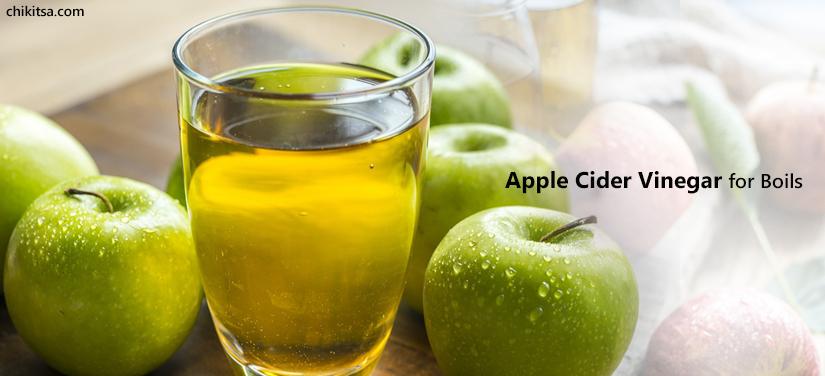Effective Ways To Use Apple Cider Vinegar For Boils

In the recent post, a lot has been spoken of the uses of apple cider vinegar or ACV not just for skin, but also for its numerous benefits for maintaining overall health and wellbeing. As the name suggests, apple cider vinegar is a product of fermentation prepared from crushed apples. Similar to normal apple juice, apple cider vinegar is loaded with nutrients such as vitamin C, vitamin B1, vitamin B2, pectin, biotin, vitamin B6, niacin, folic acid, and pantothenic acid.
Apple cider vinegar has already proved its efficacy in the control of blood glucose levels in patients with Type 2 diabetes mellitus and other health conditions related to diabetes, relief from acid reflux, hypertension, and other heart conditions, aids in digestion, and also promotes weight loss by enhancing detoxification and reducing sugar cravings. This article will let you know the uses of apple cider vinegar for boils and the effective ways to use apple cider vinegar.
What Is A Boil?
A boil is a relatively common term used for any bump on the skin. Conversely, a boil is also called a furuncle in medical terminology, which means a pus-filled bump in the skin caused commonly due to bacterial infections. Similar to a pimple, boil appears yellowish in color but is deeper and is more painful than a pimple.
A boil forms when a hair follicle and the surrounding tissues get infected as a result of a direct injury, pulling of hair, injections, or insect bites. The infection results in pus formation. Untreated or poorly managed boils can result in the formation of skin abscesses.
Does Apple Cider Vinegar Help With Boils?
Apple cider vinegar, being alkaline in nature, restore the acid-base balance in the blood. Studies suggest that our diet must be slightly alkaline. Diets that contain acidic foods result in reduced energy levels, increased risk of infections, anxiety, excess mucus production, headache, irritability, sore throat, allergic reactions, nasal and sinus congestion, and an increased risk of gout and arthritis.
[Also Read: How to relieve arthritis pain in fingers]
Generally, boils go away without demanding any specific treatment or causing any major problems. Yet, occasionally, some boils may get complicated causing deeper skin infection and excessive pus formation. Such boils need to be treated with conventional medicines or with the help of potential home remedies such as apple cider vinegar for boils.
But everyone will have a doubt of can we use apple cider vinegar for boils? Yes, Apple cider vinegar, being rich in antioxidants, helps to reduce inflammation within the boil and prevent pus formation. Also, apple cider vinegar contains acetic acid which is well known for its potent anti-bacterial properties.
How To Use Apple Cider Vinegar For Boils?
The regular use of Apple cider vinegar works miraculously when used externally as well as internally. Here you know the tips to use apple cider vinegar for boils. Add two teaspoons of apple cider vinegar along with two teaspoons of honey in a glass of warm water and drink it every day in the morning on waking up. Drinking apple cider vinegar every morning maintains the acid-base balance in the blood and stimulates digestion. The anti-inflammatory content of apple cider vinegar helps to treat boils naturally.
[Also Read: Side Effects Of Apple Cider Vinegar]
The following are some external ways to use apple cider vinegar to cure boils;
1. Plain Apple Cider Vinegar
Dip a clean cotton ball in two tablespoons of apple cider vinegar and apply it directly over the boil area. Leave the cotton ball on the boil for some time to allow apple cider vinegar to soak in. This can be done 2-3 times a day.
2. Apple Cider Vinegar With Epsom Salt
Add two tablespoons of apple cider vinegar to one tablespoon of Epsom salt and mix well. Use a cotton ball to apply this paste over the boil and cover it well for about an hour. Wash away the paste with normal water. This can be used 2-3 times a day depending upon the size of the boil.
3. Apple Cider Vinegar With Turmeric
Add one tablespoon of turmeric powder to one tablespoon of apple cider vinegar. A cream of milk may also be added to this and a paste should be made. Rub this paste over the boil area for about 5-10 minutes and wash it off. This can be done 3-4 times a day to get the best results of both turmeric and apple cider vinegar.
4. Apple Cider Vinegar And Baking Soda For Boils
Prepare a paste using one tablespoon of apple cider vinegar and two tablespoons of baking soda. Apply this paste over the boil area and leave it for at least 10 minutes. This can be repeated up to 2-3 times a day for the complete cure of the boil.
5. Apple Cider Vinegar With Lemon
Mix one tablespoon of apple cider vinegar with two tablespoons of lemon juice. Use a cotton ball to apply this solution to boils and leave it for 3-5 minutes. Wash it away using plain water. ACV with lemon can be used once a day to cure boils.
6. Apple Cider Vinegar With Olive Oil
Mix one tablespoon of apple cider vinegar with two tablespoons of olive oil. Use cotton pads to soak this solution and apply it to the infected areas. Leave it on for a few minutes and then wash it clean. This solution can be used once a day to cure boils.
7. Apple Cider Vinegar With Honey
Take equal proportions of honey and apple cider vinegar, mix well, and apply it on boils. Leave it on for 15-20 minutes and wash it with clean water. This can be used once or twice daily for boils.
Conclusion
Several ways are mentioned above in which where you can use apple cider vinegar for boils naturally and in a relatively painless way with the help of some of the most commonly used kitchen ingredients. However, the possibility of a simple boil to complicate and transform itself into a carbuncle or a deep skin abscess must not be under-estimated.
It is therefore advisable to seek professional help and get the boil treated with medicines like antibiotics and anti-inflammatory drugs before the infection spreads to deeper layers of the skin. Apple cider vinegar is such cases may be used as an adjunct to conventional therapy, rather than replacing it completely.









